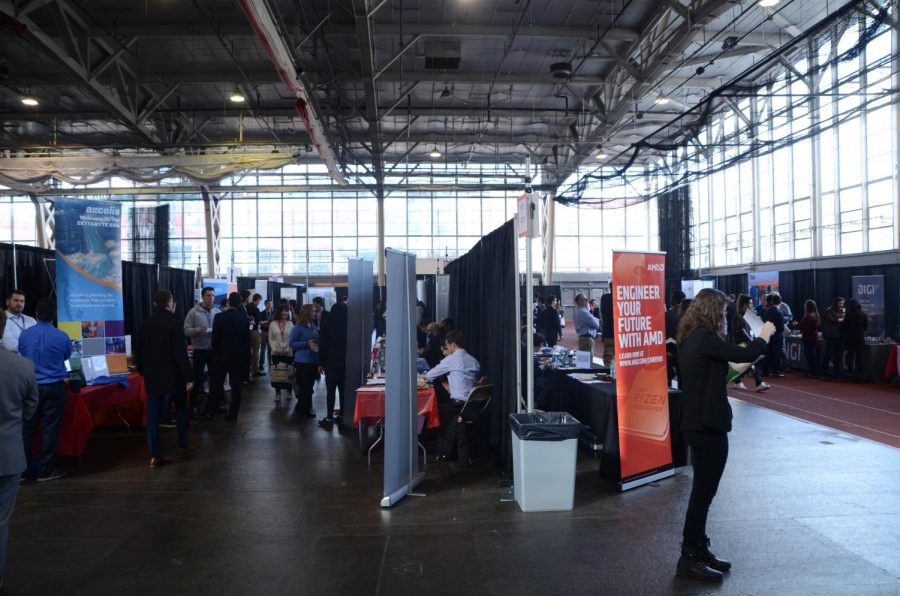NU co-op students grapple with company ties to ICE
Many companies that work with ICE can be found at NU’s career fairs multiple times per semester.
September 18, 2019
In June, Northeastern co-op students at Wayfair found their employer thrust into the political fray when the e-commerce company sold $200,000 worth of children’s bedroom furniture to a contractor that operates a detention center for migrants near the U.S.-Mexico border.
Since the enactment of President Donald J. Trump’s administration’s family separation policy, adults and children who cross the southern border together without authorization are held in separate detention centers. Since 2018, seven children have died in immigration custody while thousands more are being held in overcrowded, unsanitary facilities.
After Wayfair executives refused to back out of the detention center sale, more than 500 employees staged a walkout of Wayfair’s Copley Place headquarters. The backlash was part of a string of recent cases of employee activism at companies conducting business with the Trump administration.
As corporations’ ties to agencies such as Immigration and Customs Enforcement, or ICE, come under increasing scrutiny from employees and the public, co-op- and job-seekers have become more conscious of employers’ political stances.
While only a small number of the university’s thousands of co-op partners have connections to ICE, they include coveted employers such as the world’s largest professional services firms and technology giants Dell and Wayfair. Amazon Web Services, another NU co-op partner, came under fire from employees in July for its business with Palantir, a big data company that provides ICE with analytics software.
As one of Northeastern’s largest co-op employers, Wayfair currently offers students 251 openings across the company’s marketing, finance and technology teams during the spring cycle.
The News spoke with current and former Wayfair co-op students on the condition of anonymity, as the company requires students to sign non-disclosure agreements prohibiting them from speaking to the media about their experiences.
While many co-ops disagreed with Wayfair’s actions, some acknowledged that working for a large corporation doesn’t necessarily mean endorsing its practices.
“If they’re providing beds to detain[ed] children, that’s a crappy thing to do, but there’s a level between that and building more child prisons,” a student currently on co-op at Wayfair said. “If one side of the company is providing beds to prisons and I’m completely on the other side, I won’t like it and I’ll try to change it, but I won’t write off every single company that doesn’t 100 percent match my morals.”
Even while protesters marched outside of Wayfair’s offices, students described the workplace environment as “business as usual.” None of the co-op students that The News spoke with participated in the walk-outs.
Co-ops said that when the issue came up at a new hire orientation, a company representative reiterated to new employees that Wayfair had acted in full compliance with the law.
Three of the four largest professional services firms in the world, known as the Big Four, have also drawn criticism for their work supporting ICE. Northeastern currently places co-ops at all of the Big Four.
Since 2017, Big Four firm Deloitte has signed over $50 million in consulting contracts with the immigration agency. While employees have petitioned the firm to end its work with ICE, Deloitte has maintained it has played no role in the separation of migrant families.
PricewaterhouseCoopers, a Big Four co-op employer, engaged in a $5 million contract supporting “detention compliance and removals,” according to Newsweek.
Nathan Porelle, a third-year business administration major who worked as an audit and assurance co-op at Deloitte last spring, said he believes the firm’s ICE business represents a big political statement.
“When people who come into the country are treated the way they’ve been treated, that’s not even a controversial issue for me. It’s just a big ‘no’ issue,” Porelle said. “The problem comes down to the human rights violations. If you want to get involved in a situation like that, it’s going to speak a lot about what your company stands for.”
Nonetheless, Porelle said Deloitte’s engagement with ICE represents only a sliver of its expansive professional services business, and working for a separate area of the company doesn’t equate to supporting the immigration agency.
“For me, at Deloitte, there were a lot of levels of removal from the part of the firm that was working on ICE contract, so it wouldn’t have been a disqualifier for me to work there,” he said.
As students vie for co-ops this fall, employers’ political stances could play a greater role in the job search. 75 percent of workers ages 18 to 24 expect their employers to take a stand on social issues, a Glassdoor survey found.
“I may not have considered politics in the context of a job search in the past, but it really comes down to values and ethics,” said Janet Cheng, a third-year business administration major. “I want to align myself with brands whose values are consistent with my own, political or otherwise.”
Northeastern itself had a $7.8 million research contract with ICE for tracking technology exports that could be used to create weapons. Although unrelated to the agency’s immigration mandate, the contract sparked backlash from students and community members in the summer of 2018 and has since ended.
Ultimately, Porelle said he believes the co-op program should offer students choices, but that employers should be held to a high ethical standard.
“The university should have a focus on finding employers that represent the same values that they do. Students should be aware and follow their morals, but some of it’s on the university to become consistent,” he said. “I could be wrong, but I don’t think Northeastern wants its students to go out and commit human rights violations.”







